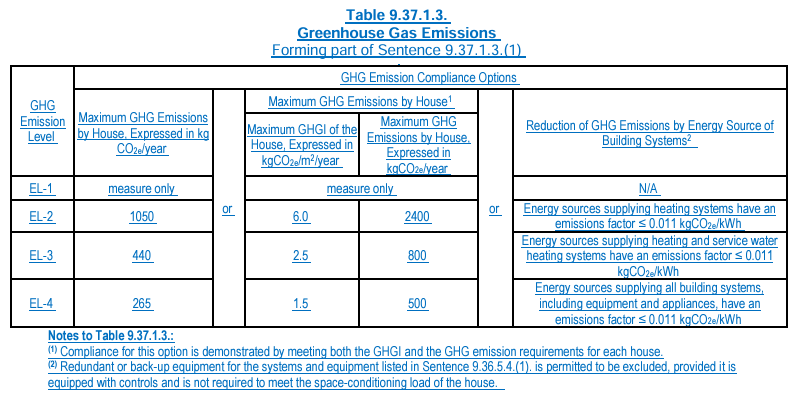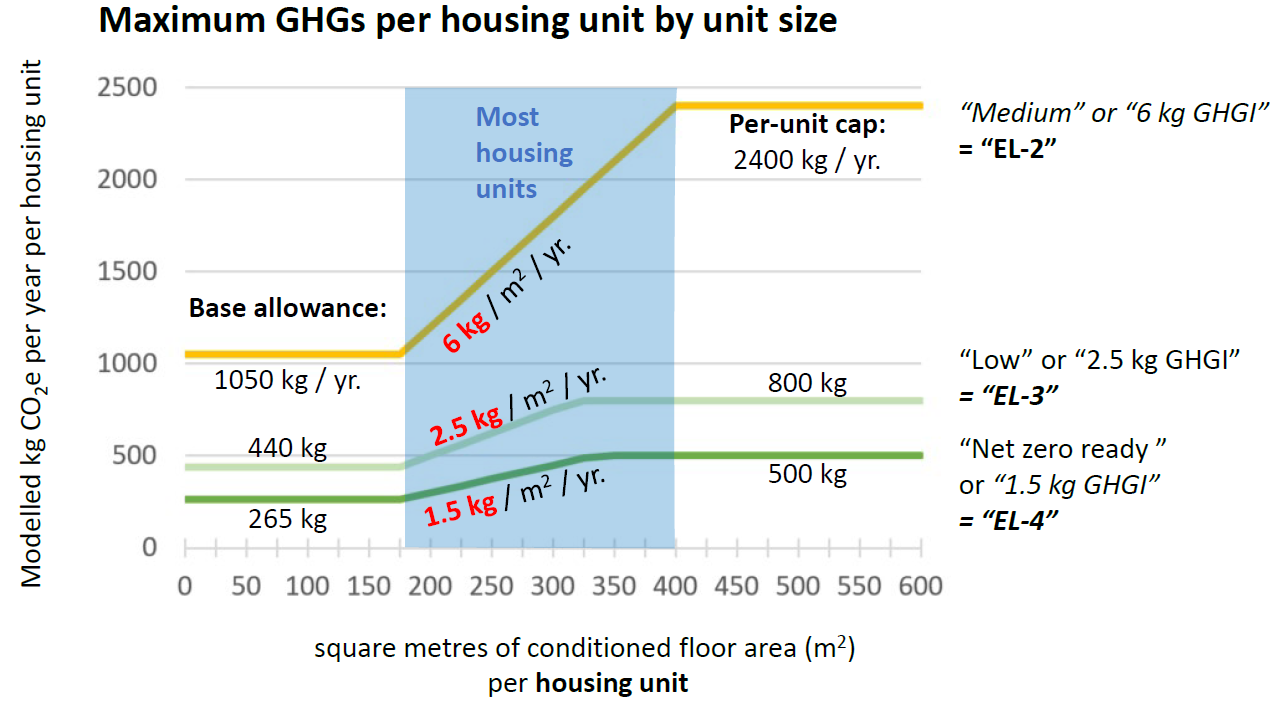Better Buildings - Resources for Designers, Builders & Residents
Energy and Zero Carbon Step Codes in Richmond
Part 9 Residential Buildings
City of Richmond Regulatory Compliance Options
Energy Step Code requirements for Part 9 building units are defined by Section 9.36.6 of the BC Building Code.
Building Permit application acceptable to the City:
| Submitted Jul 1, 2022 to Oct 30, 2023 |
Submitted on or after Oct 31, 2023 |
| Step 5 (a) OR Step 4 (b) OR Step 3 (b) + LCES(c) |
Step 5 (a)(d) + EL-2 OR Step 4 (b) + EL-3 OR Step 3 (b) + EL-4 |
| (a) Building envelope performance requirement can be achieved using all compliance pathways defined in BCBC. (b) Building envelope performance requirement must be achieved using the TEDI compliance pathway. Natural-gas fueled space heating systems must be modelled as the primary system. (c) See definition of “Low Carbon Building Energy System” for Part 9 buildings on p.40-41 of City of Richmond Bylaw No.7230. (d) Natural-gas fueled space heating systems can be modelled as a "back-up" system. |
|
Zero Carbon Step Code requirements for Part 9 building units (as modelled), are defined by Section 9.37 of the BC Building Code:
- EL-2: ≤ 1,050 kg CO2e, OR ≤ 6 kg CO2e/m2 of conditioned floor area AND ≤ 2,400 kg CO2e per housing unit per year.
- EL-3: ≤ 440 kg CO2e, OR ≤ 2.5 kg CO2e/m2 of conditioned floor area AND ≤ 800 kg CO2e per housing unit per year.
- EL-4: ≤ 265 kg CO2e, OR ≤ 1.5 kg CO2e/m2 of conditioned floor area AND ≤ 500 kg CO2e per housing unit per year.

 Note:
Note:
GHG emissions from natural gas space heating and hot water heating are included in the totals above.
Gas stoves and other ancillary uses of natural gas are not affected by these requirements.
Part 3 Buildings
City of Richmond Requirements
Energy Step Code requirements for Part 3 building units are defined by Section 10.2.3 of the BC Building Code.
| Effective Date | Jul 1, 2022 to Oct 30, 2023 |
On or after Oct 31, 2023 |
| Office & Retail Buildings | Step 3 OR Step 2 + LCES(d) |
Step 3 + EL-1 OR Step 2 + EL-2 |
| Residential Wood-frame Low/Mid-Rise | Step 4 OR Step 3 + LCES(d) |
Step 4 + EL-1 OR Step 3 + EL-2 |
| Residential Concrete Towers | Step 3 OR Step 2 + LCES(d) |
Step 3 + EL-1 OR Step 2 + EL-2 |
| Hotels & Motels | Step 3 OR Step 2 + LCES(d) |
Step 4 + EL-1 OR Step 3 + EL-2 OR Step 2 + EL-3 |
|
LCES: Low-Carbon Energy System |
||
Zero Carbon Step Code requirements for Part 3 building are defined by Section 10.3 of the BC Building Code.

Bulletins
| Regulation | Reference Bulletins (Provided in PDF format) |
| Energy Step Code | Requirements at Rezoning and Development Permit Stages (DevApps-13) Part 9 Buildings Overview (Building-37) Part 9 Single Family Dwellings and Duplexes (Building-38) Part 9 Townhouses and Apartments (Building-39) Part 9 Residential Drawings (Air-barrier Details) (Building-43) Part 3 Buildings (Building-40) |
| Energy Step Code, NECB ASHRAE 90.1 |
Energy Efficiency Requirements for Part 3 Buildings (Building-48) |
| High-Performance Incentives | Incentives for New High-Performance Single-Family and Duplex Dwellings (Building-46) |
Events and Webinars
Builders' Breakfasts
Builders' Breakfasts are the City's main venue for connecting with designers, builders, and energy advisors in Richmond.
Upcoming Sessions:
Are you developing or constructing new houses, multiplexes and townhouses in Richmond?
Richmond staff want to continue to gather information that will best support your success in building to current and potential future Step Code requirements.
- Thursday, December 11, 2025, 8:00–10:00am
- Theatre Under The Stairs (Performance Hall)
- Richmond Cultural Centre 7700 Minoru Gate, Richmond, BC
- Registration required; register online.
Contact energysave@richmond.ca for more details.
Previous Sessions
|
City of Richmond Builders' Breakfast Summer 2023 – Recommended Requirements on Energy Step Code |
|
|
2022 Step Code Requirements and Incentives |
Update on Richmond's Energy Step Code Requirements July 2022 Building Bylaw |
|
2022–2025 Energy Step Code Requirements for Part 9 Buildings | Workshop #2 |
Introduction to the Passive House Standard |
|
City of Richmond's High-Performance Incentives |
Building to the Passive House Standard |
|
Performance Testing and Labeling of Windows, Doors and Skylights in Canada |
Best Practices in Air Barrier Design, Installation and Testing |
|
Exterior Air Barrier and Insulation Strategies |
High-Performance, Low-Carbon Mechanical Systems |
|
Integrated Design Process: An Introduction |
What Does It Take to Build a High-Performance House? |
Building Matters
Building Matters brings you the latest in research on the environmental footprint of buildings, with a focus on implications for policy development and implementation.
Upcoming Sessions
Coming soon.
Previous Sessions
|
Are Cities Underestimating Their GHG Emissions? |
Efficiency First: Europe's Approach to Decarbonizing the Built Environment |
|
Net-Zero Energy Buildings: Will Canada's New Codes Give Us What We Need? |
Embodied Emissions of Building to the BC Energy Step Code |
If you have any questions about or suggested topics/speakers for either series, email energysave@richmond.ca.
External Resources
BC Housing- BC Energy Step Code Design Guide
- Best Practice Guide: Air Sealing & Insulation Retrofits for Single Family Homes
- Building Enclosure Design Guide: Wood-Frame Multi-Unit Residential Buildings
- Full list of BC Housing design and Construction Guidelines
BC Hydro

